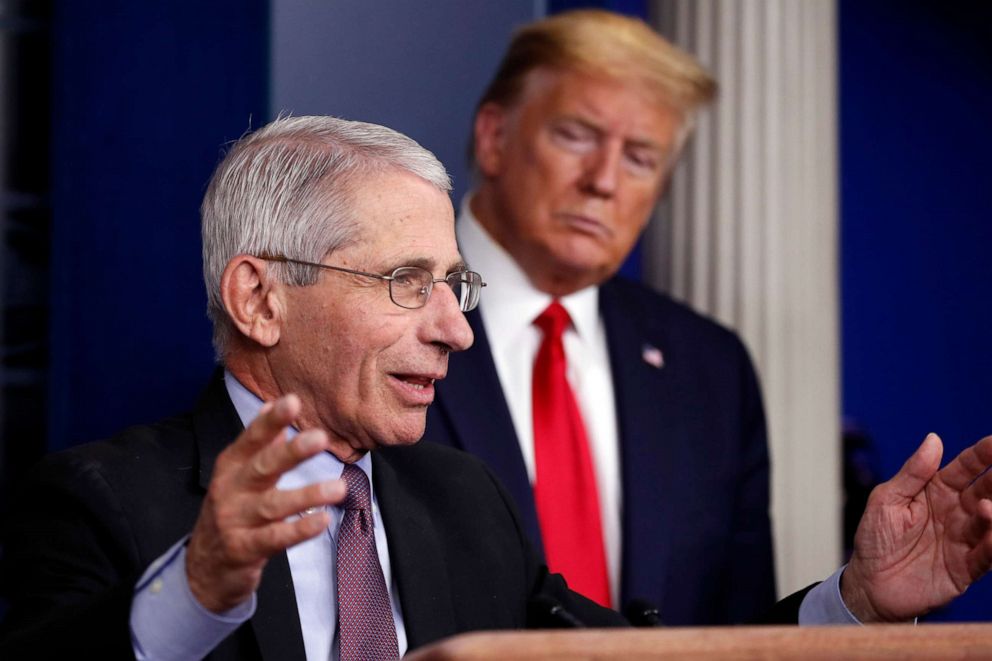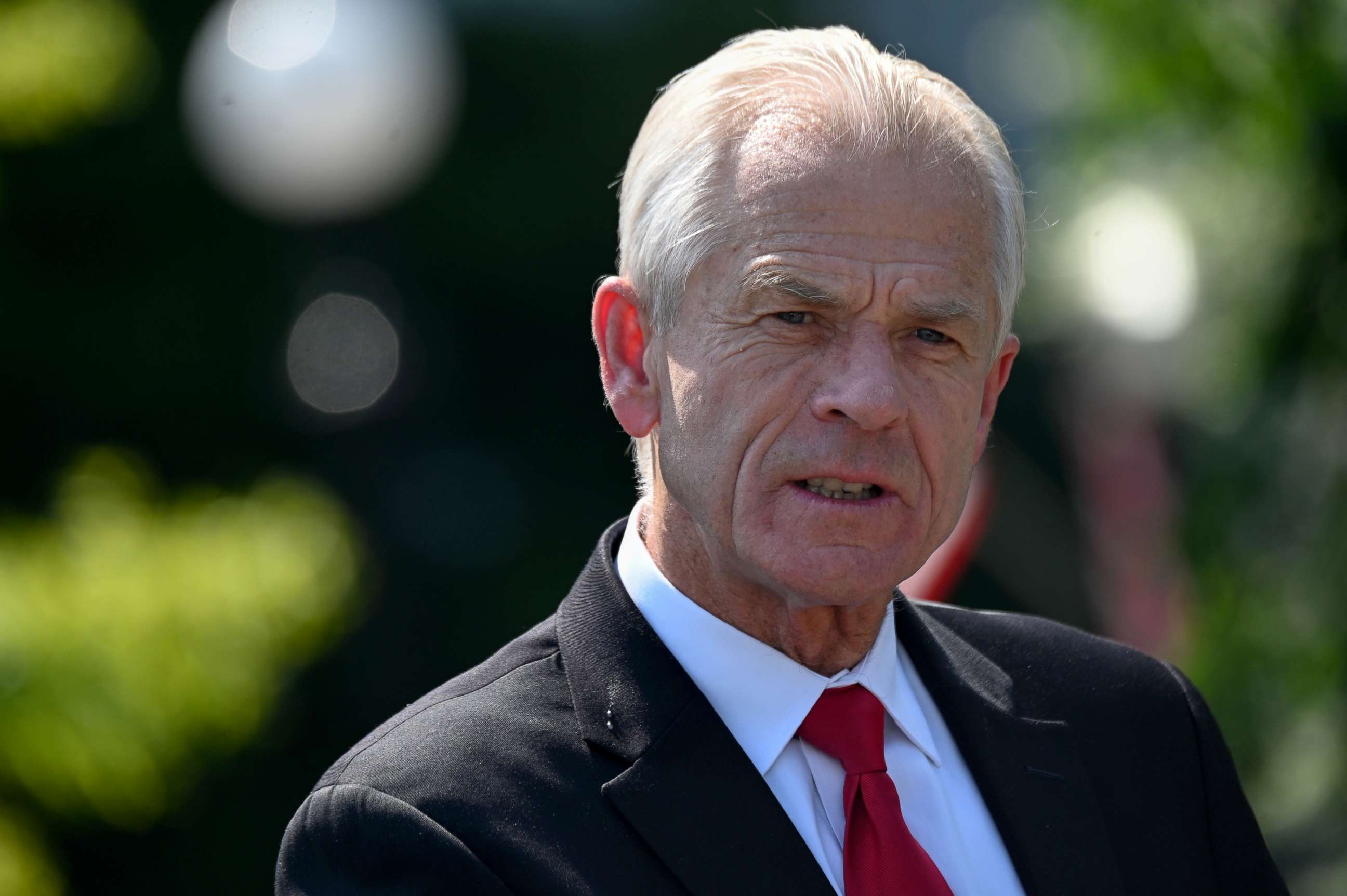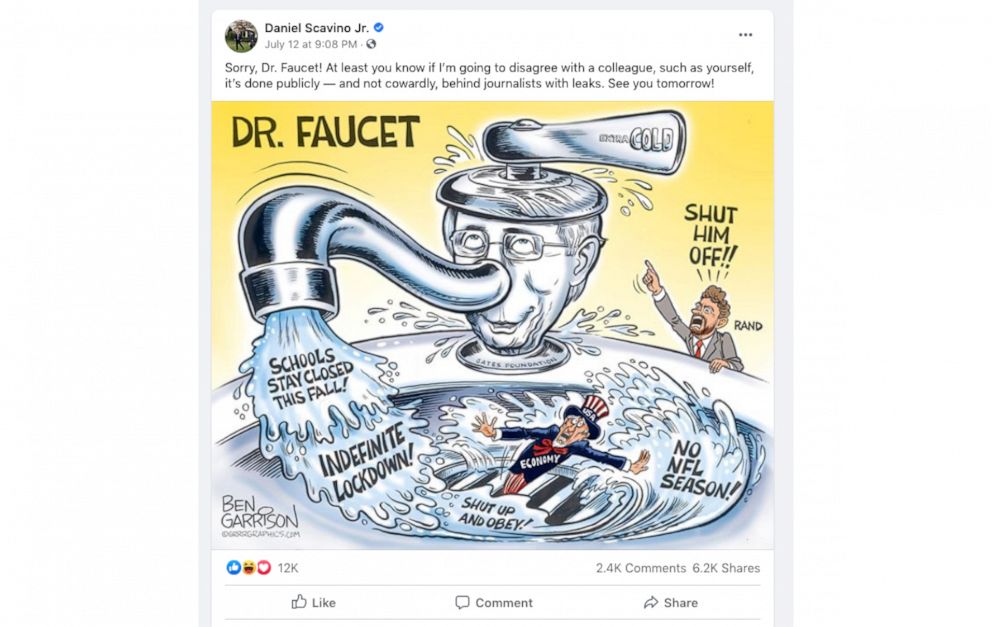Fauci fires back at White House aide who trashed him in op-ed
"Let's stop this nonsense," Fauci said.
The White House on Wednesday distanced itself -- but did not disavow -- claims made in an op-ed by the president's top trade adviser, Peter Navarro, trashing the nation's foremost infectious disease expert, Dr. Anthony Fauci.
Fauci, later in the day, in a move unusual for him since he considers himself a scientist who tries to stay out of the political fray, took on Navarro directly, saying, "he's in a world by himself" and called the White House effort to discredit him "bizarre."
"Let's stop this nonsense," he said, in a livestreamed interview with The Atlantic.
The latest extraordinary escalation in the attacks on Fauci began in earnest, when, in a remarkable broadside against Fauci, who polls show the American public broadly trusts for information on the novel coronavirus, Navarro wrote in the op-ed for USA TODAY Tuesday that "Fauci has a good bedside manner with the public, but he has been wrong about everything I have interacted with him on."
Navarro, who has no known medical expertise, went on to contrast his own response to the coronavirus pandemic with misleading characterizations of Fauci's own comments on the virus. A portion of what he wrote was also included as a statement from him in a Washington Post article published Saturday.
"So when you ask me whether I listen to Dr. Fauci’s advice, my answer is: only with skepticism and caution," Navarro wrote.

Asked on Wednesday if he was OK with Navarro's op-ed, Trump did not take issue with its content.
"Well, that's Peter Navarro, but I have a very good relationship with Dr. Fauci," Trump told reporters in the Oval Office.
Later, as he departed the White House en route to Atlanta, Trump said Navarro should not have written an opinion piece "representing himself."
"Well, he made a statement representing himself," Trump said. "He shouldn't be doing that."
Asked about Navarro's attack and the White House campaign to discredit him during the question-and-answer session with The Atlantic, Fauci responded, "It is a bit bizarre. I don't really fully understand it. You know, I think that would happen with that list that came out I think if you sit down and talk to the people who are involved in that. They are really, I think taken aback by what a big mistake that was, and I think if you talk to reasonable people in the White House they realize that was a major mistake on their part because it doesn't do anything but reflect poorly on them.
"And I don't think that that was their intention. I don't know -- I cannot figure out in my wildest dreams why they would want to do that, but, I mean, I think they realize now that that was not a prudent thing to do because it's only reflecting negatively on them. I can't explain Peter Navarro -- he's in a world by himself. So, I don't even want to go there,” Fauci said.
"We've got to almost reset this and say, okay, let's stop this nonsense and figure out how can we get our control over this now. And looking forward, how can we make sure that next month, we don't have another example of California, Texas, Florida, and Arizona, because those are the hot zones now, and I'm looking at the map, saying we got to make sure it doesn't happen in other states. So, rather than these games people are playing, let's focus on that," he said.
Among Navarro's qualms with Fauci, the longtime director of the National Institute of Allergy and Infectious Diseases, is over the efficacy of the antimalarial medication hydroxychloroquine. Long touted by President Donald Trump and Navarro as a promising treatment for COVID-19, Fauci for months disagreed, and the U.S. Food and Drug Administration determined it was "unlikely to be effective in treating COVID-19."
The latest criticism fit a pattern of the Trump administration minimizing public health experts and prioritizing an economic recovery, which the president sees as key to his reelection chances.
Earlier Wednesday, a senior White House official, director of strategic communications Alyssa Farah, tweeted that Navarro's op-ed "didn’t go through normal White House clearance processes and is the opinion of Peter alone."
While she added that the president "values the expertise of the medical professionals advising his Administration," she did not disavow anything Navarro wrote.
Separately, a senior White House official said Navarro "went rogue, and put out his personal opinion without any approvals." The official, who would speak only on the condition of anonymity, said "the White House does not stand by these unauthorized opinions and Mr. Navarro owes Dr. Fauci an apology.”
Navarro did not respond to a request for comment on whether he got approval from the president or any other White House official before publishing the op-ed; the White House also did not respond when asked if he got permission from any official outside the communications office.
Asked if Navarro would be punished for writing the op-ed, a White House official said, “We do not comment on internal personnel matters, but [White House] Chief of Staff Mark Meadows is fully engaged.”
A second, senior White House official confirmed Meadows’ involvement but would not elaborate.
Navarro's attack came as the White House sought to discredit Fauci, who has provided a more blunt and sobering assessment of the state of the epidemic than the president and his top aides have sought to project -- one they see as politically inconvenient as Trump campaigns for re-election.

Over the weekend, the White House provided several media outlets with a misleading list of comments made by Fauci, in an effort to undercut him.
The White House on Monday then tried to deny there was a behind behind-the-scenes campaign to discredit the nation’s leading infectious disease expert.
“There is no opposition research being dumped to reporters. We were asked a very specific question by The Washington Post, and that question was President Trump noted that Dr. Fauci had made some mistakes, and we provided a direct answer to what was a direct question,” McEnany said.
But despite the denial of a privately waged smear campaign, one of the president’s top aides made no effort to hide his disdain, airing criticism of Fauci in plain view on social media.
The White House's deputy chief of staff for communications, Dan Scavino, who has been by the president’s side since the 2016 campaign, on Sunday posted a cartoon on Facebook depicting Fauci as a running faucet washing the U.S. economy down the drain.
“Sorry, Dr. Faucet! At least you know if I’m going to disagree with a colleague, such as yourself, it’s done publicly — and not cowardly, behind journalists with leaks. See you tomorrow!” Scavino wrote in a caption accompanying the cartoon.

On Monday, Trump himself shared a tweet disparaging Fauci -- misconstruing a months-old comment Fauci had made -- before telling reporters later in the day that he liked Fauci "personally," had "a very good relationship" with him, and considered him "a very nice person."
But, he added, "I don't always agree with him."
While the president and White House have sought to downplay the appearance of conflict that they have directly stoked, Fauci has been increasingly sidelined within the White House's coronavirus task force.
He is no longer a regular presence at task force briefings with the media led by the vice president, he was not a participant on the vice president’s weekly call with governors on Monday, and it’s been two months since Fauci says he has personally briefed the president.
Trump, facing re-election this year, is facing broad disapproval for his management of the pandemic. In an ABC News/Ipsos poll released Friday, 67% of Americans said they disapproved of his oversight of the crisis, a new low since ABC News/Ipsos began surveying on the coronavirus in March.
Fauci has had a higher approval rating than the president in national polls related to the coronavirus response.
At an event in Kentucky Wednesday -- when asked "What's your level of confidence in Dr. Fauci at this point?" -- Senate Majority Leader Mitch McConnell answered, "Total."
ABC News' Katherine Faulders and Sophie Tatum contributed to this report.




